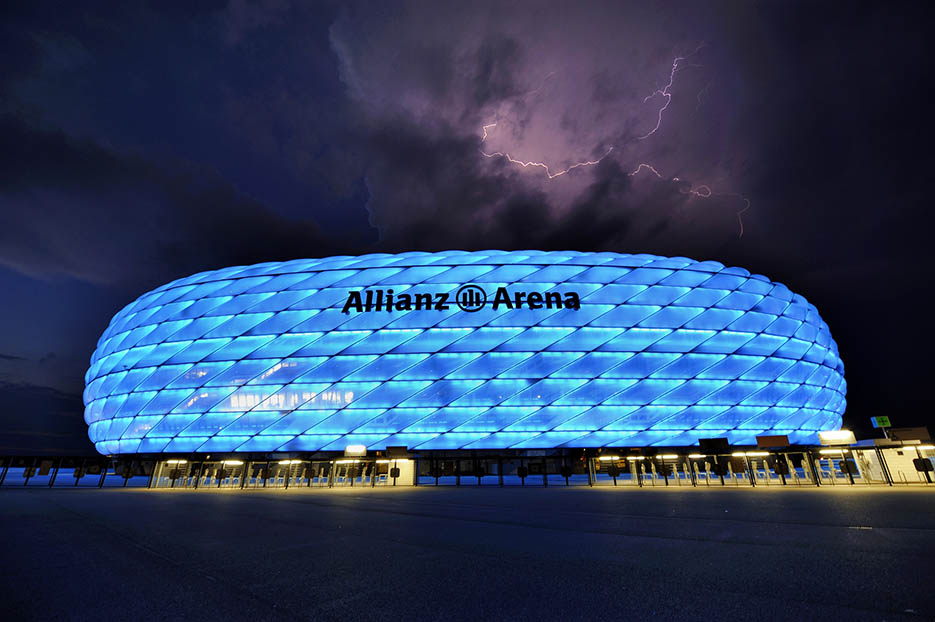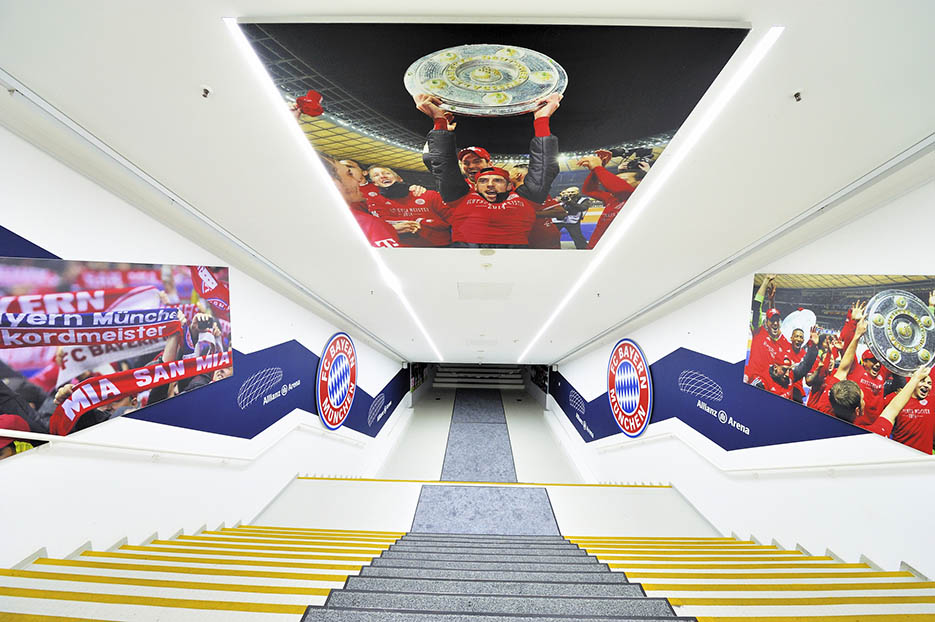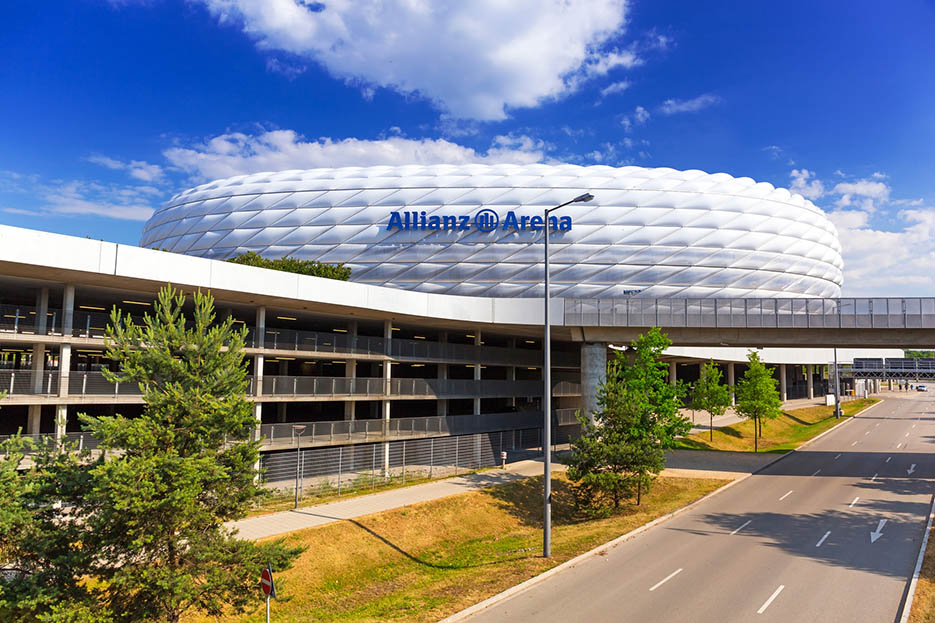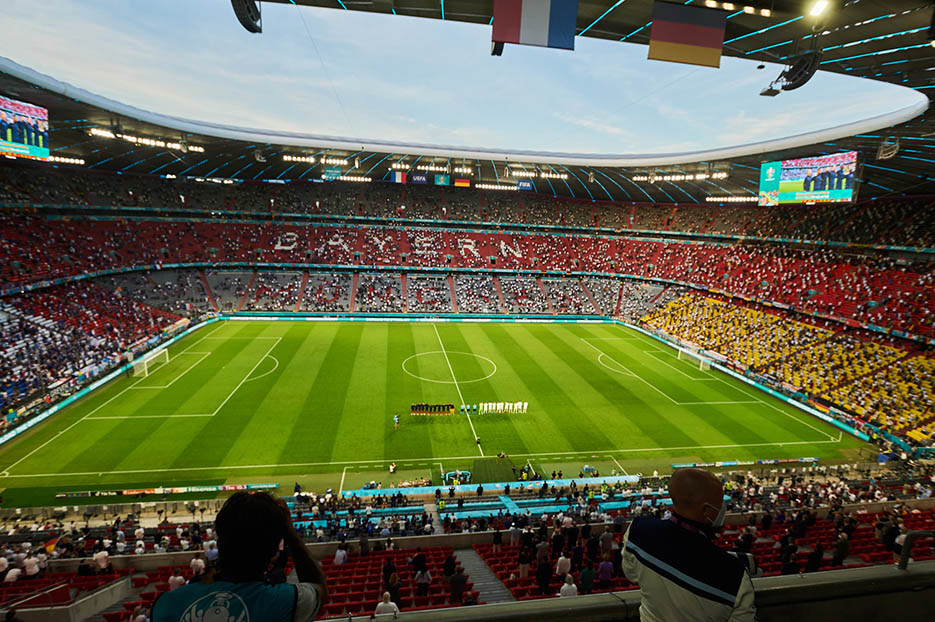Frankfurt Arena Complete Guide - Furnace Too Hot for the City
One of the Bundesliga’s most fiery stadiums will host the 2024 EURO matches - check out all you need to know in this Frankfurt Arena Complete Guide.


Certainly one of the most iconic stadiums in Europe, arguably the most recognizable one, due to its still-futuristic-looking design, Allianz Arena was a deadlock for hosting the Euro 2024. Only, not under its known name, that fits the club playing on it (Bayern Munich) so much so that it masks the irksome truth - it's only a sponsor's label. Not for football heritage reasons, but for protecting sponsors of their own, UEFA banned sponsorship names for its tournament hence you're reading a Munich Football Arena complete guide, not that of an Allianz Arena.
The generic name laced upon the sci-fish footballing lair in the capital of Bavaria is the only thing commonplace about the ground.
The importance of the Allianz Arena... erhm, Munich Football Arena, is visible by the stadium getting the honour of opening the 2024 EURO tournament. As is tradition, the home side will play the first game of the competition and Scotland will have the tough task of withstanding the pressure.
The stadium will hold six matches in total. Four in the groups, two in the knockout stages one of which will be a semi-final game!
Serbian fans, who are already numerous in Munich due to high immigration to Germany, will be present for two group games. Possibly even a third one in the knockout stages' first round.
Germany vs Scotland (Friday, June 14th, 21:00) in Group A
Romania vs Play-off Winner B (Monday, June 17th, 15:00) in Group E
Slovenia vs Serbia (Thursday, June 20th, 15:00) in Group C
Denmark vs Serbia (Tuesday, June 25th, 21:00) in Group C
1st from Group E vs 3rd from Groups A/B/C/D (Tuesday, July 2nd, 18:00) Round of 16 W45 v W46 (Tuesday, July 9th, 21:00) Semi-finals
The second game at the Munich Football Arena in the 2024 Euros will see Romania face off against the best from the qualification play-off duel path B which consists of four countries: Bosnia and Herzegovina vs Ukraine and then Israel vs Iceland. The winner of these two duels will face each other, and the final victor will face Belgium, Romania, and Slovakia at the EURO.
Considering the fifth match at the Munich Football Arena will be played between the winner of the 1st-placed from Group E, and the best third-placed team from groups A, B, C, and D, there is a possibility Serbia plays on this ground three times in a row.
One of the semi-finals will also be played at this ground.

The Allianz Arena, a marvel of modern engineering and home to Bayern Munich and one of the most distinct modern buildings globally, is a rare example of modern arenas done right. Even the logo of the stadium is more recognizable than most other newer stadiums.
The journey began in 2002 when the Bavarian giants decided it was time for a new stadium. What followed was years of meticulous planning and collaboration between architects Herzog & de Meuron and structural engineers Arup Group. The innovative design, characterized by its striking exterior comprised of 2,760 diamond-shaped inflated panels, immediately marked Munich's skyline.
Its straightforward, yet effective technology allows the panels to change colors depending on which team is playing.
Completed in 2005 at a cost of €340,000,000.
Bayern Munich, although giants of world football, have played their games at the Munich Olympic Stadium since 1972. Sharing it with the rivals Munich 1860. Same as they did with the Allianz Arena, until 2017.
The Munich Football Arena underwent multiple expansions in the following years, bringing its current capacity to 75,024 for domestic matches, and 70,000 for UEFA and FIFA matches.
For the matches at the Euro 2024, the Munich Football Arena will have a capacity of 66,000 people!
On its approach, the Allianz Arena has an elevated grassy walkway with paved lanes crisscrossing each other making the stadium look like a comet, and the paths - its tail. Yet it actually hides the largest underground parking structure in Europe with 9,800 parking places, with 350 spaces for buses, and 130 more spots are reserved for those with disabilities.
Another interesting story about the Munich Football Arena is that it was shared between the city's largest clubs, Bayern Munich and Munich 1860. The stadium showed their colours depending on who was playing, but more on that later.
The opening matches were done by both teams, on 30th May Munich 1860 defeated Nuremberg 3:2. A day after Bayern defeated a selection of Germany by 4:2.
The Allianz Arena will be the first stadium in history to host games in consecutive EUROs after holding three group matches at the pan-continental EURO 2020.
Of course, the biggest match so far played on the stadium has happened in 2012 when the local Bayern lost the Champions League final to Chelsea. The Champions League final returns to the stadium in 2025.
Even though the stadium was built for €340,000,0000, in April 2006 FCB bought out Munich 1860's 50% of the share in the arena for just €11,000,000! The smaller club was in a dire financial situation and had to agree, even though they had a clause by which they could've re-bought their shares by 2010 for the same sum. Now Bayern owns the stadium in its entirety.
Now, the stadium is lit up only by the red colours of Bayern, and the flag of Germany when the national team plays there. The exterior could be lit up in any shape, and interchanging lighting schemes are theoretically possible, but the police don't allow it because it detracts the attention of drivers on the nearby A9 highway and causes crashes.
The light show is so strong that - on clear nights - the stadium can be viewed from high up in the Austrian mountains, some 80 kilometres away!
The stadium has a roof that covers the entire terraces, but of course, due to winds, not everyone is going to be safe from rain. Additionally, the roof has built-in roller blinds which may be drawn back and forth during games to provide protection from the sun.
On the inside, the stadium has three levels. On one longer end we see the recognizable FC Bayern crest. On the smaller stand, across three levels it's written "FC Bayern München" which is Munich in German.
The whole structure has the dimensions of 258m x 227m x 52m.
The actual pitch has the dimensions of 68m x 105m, while the entire grass field that of 72m x 111m. The total surface from barrier to barrier is 120m x 83m.
There are two 200 m? LED Video Walls in 16:9 format, placed 42.5 m above ground for all the moments you'd want to see again.
The stadium itself has 6,000 m? of catering facilities divided between fast food kiosks, two restaurants, a bistro, business clubs, VIP boxes, and will probably be increased with the additional kiosks for the Euros.

The city of Munich is the capital of Bavaria, the biggest and second-most populous federal state of the country. Bordering Austria to the south and Czech Republic to the east. The city is located in the south of Germany, 60 kilometres from the border with Austria.
The closest notable city is Augsburg, also 60 kilometres away, with the historic town of Ingolstadt located 80 kilometres away.
Munich has an international airport, however, it is 32 kilometres away from the city and some 22 from the Munich Football Arena. Both are located northeast of the city core. While the main train station is located near the city centre.
A train ride of 45 minutes separates the airport from the main train station.
Long-distance national train services to Munich Central Station include the lines
- Hamburg – Berlin – Munich; from the north to the south
- Dortmund – Cologne – Frankfurt – Munich; from the west to the southeast
- Karlsruhe – Stuttgart – Munich; from southwest to southeast
International train destinations include Paris (France), Budapest (Hungary), Salzburg, Klagenfurt & Vienna (Austria), Bologna (Italy) and Zurich (Switzerland).
In Munich, hostels cost around €20 per night, rental apartments are three times that, and hotels can be found from €80 a night. While luxury hotels stand at €150 per night. However, the prices will increase as the Euro comes closer.
Munich is a fairly spread-out city, divided by the river Isar. With the old part of town on the left bank.
The stadium is found completely outside of the city though, on the crossroads of two highways, 9 and 99. Hence, the walk to the game isn't the best option.
The address of the Munich Footbal Arena is Werner-Heisenberg-Allee 25, 80939.
The city is very bike-friendly with a lot of rental places. E-scooters are available too but are banned for parking in the stadium and the fan zone area. Taxis and ride-sharing services are also available in the city.
The Munich Football Arena is connected with subway line U6 and the Frottmaning station located just at the stadium.
Of course, there is the Bayern FC museum located in the very Allianz Arena.
As this is a sporting website and the EURO is a sporting event, there will be stadium hoppers amongst those reading this.
As such a major city of 1,578,132 people, there are multiple notable grounds besides the Munich Football Arena.
- Olympic Stadion Munich is the most recognizable on the account of Bayern playing there for years. But also due to its unusual roofing resembling that of a tent. Especially as it covers just one side of the terraces. It's located in the broader Olympiapark Munich, with the exact address: Spiridon-Louis-Ring 25.
- The Grunwalder Stadion is however now the second-most important ground in the city, as that's where Munich 1860 plays its games since leaving Allianz Arena. It's located on the right side of the city, at the Grünwalder Str. 2-4.
Another gem of the city of Munich is the BMW brand world museum, located close to the Olympic stadion.
While visiting Munich for the 2024 Euros, take the opportunity to explore this vibrant city beyond the football arena. Immerse yourself in the rich history and culture by visiting popular attractions such as the majestic and massive Nymphenburg Palace, the iconic Marienplatz square, and the world-renowned Hofbräuhaus brewery - if that's more your speed.
In that spirit - a map view of the city shows almost a concrete hole in the middle of it, well that's the needed space for the world-famous Oktoberfest.
Near the incredible Munich Residenz palace the city also has the expansive English Garden park. Not far from there is the Alte Pinakothek Art Museum.
On a far different note, the Dachau Concentration Camp Memorial Site is located just 16 kilometres from the centre of Munich.

As the Munich Football Arena is so isolated, there aren't many options for hotels in its vicinty. But that's not where the party is going to be at anyway.
Massive viewing of matches will be done on a big screen at the Olympic Lake, near the Olympic Stadium Munich. Truly a fairy-tale-like setting for watching the games.
Actually, the entire Olympic park will be a fan zone - and the best thing is - you don't need a ticket to get in.
The Olympic Park is just around 4 kilometres away from the city centre.
The subway station U-Bahnhof Olympiazentrum is the nearest to it, with U3 and U8 lines stopping there.
While the bus line 144 stops right in the Olympiapark.
Hopefully, this Munich Football Arena complete guide will make you enjoy the games all that much more. But remember, don’t stare at the colourful ground when you’re driving!

One of the Bundesliga’s most fiery stadiums will host the 2024 EURO matches - check out all you need to know in this Frankfurt Arena Complete Guide.
The Stuttgart Arena complete guide will maximize your enjoyment for the upcoming Euro 2024, and prepare you with all the interesting and important tidbits.
Arena AufSchalke complete guide will inform you about all you need to know in order to have a fulfilling EURO 2024 experience in Gelsenkirchen.
The Leipzig Stadium guide will get you up to speed with everything you need to know for the Euros 2024. But also for visiting the Red Bull Arena otherwise.
BVB Stadion Dortmund complete guide will have you geared up and completely ready for the ultimate EURO 2024 experience in one of Germany's best football cities.